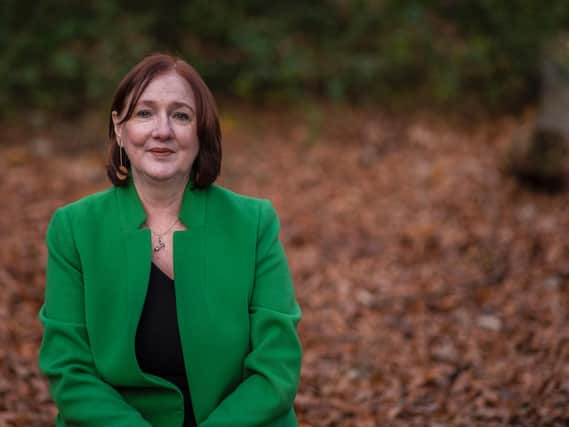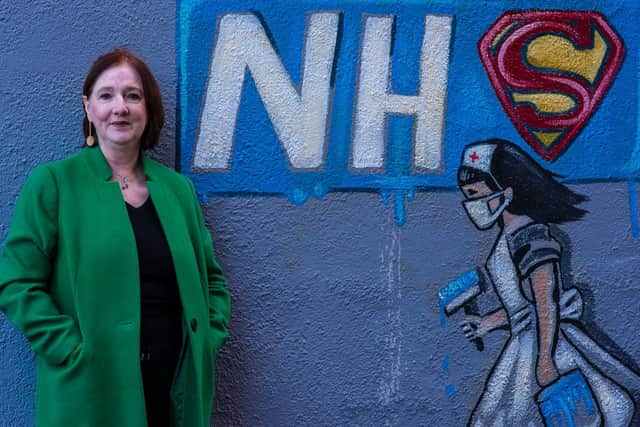Meet the retired Leeds research nurse now taking part in a Covid-19 vaccine trial


Debbie Beirne still receives a Christmas card each year from a patient she looked after nearing three decades ago.
Speaking over the phone from her home in Moortown, Leeds, her voice cracks as she recounts how the woman, who was being treated for leukaemia, has continued with the gesture for such a length of time.
Advertisement
Hide AdAdvertisement
Hide AdHer audible emotion is testament not only to the passion and dedication that she has afforded to almost 40 years in healthcare before retiring earlier this year but the bonds that she has formed with many of those who have been under her care.


“I loved helping people through months of treatment,” she recalls. “It was very upsetting when you lost people but at the same time, you had such commitment to caring for a group of patients, that it helped you cope.
"You could go away, have a cry, talk with other staff but there’d always be more patients in front of you in need of support. It felt very much like a joint relationship, not a power imbalance. Patients often feel very vulnerable and I think that’s why the approach really matters so patients feel you’re working with them.”
The nation was in the grips of the Covid-19 crisis when Debbie worked her last day back in March, having spent her whole career with Leeds Teaching Hospitals NHS Trust. “I wasn’t sure whether I’d actually finish or whether I’d be needed to stay on,” she says. “But within the trust at the time, because a lot of the other services were pared down to cope with Covid, they had enough nursing staff to redeploy.”
Advertisement
Hide AdAdvertisement
Hide Ad“It was a very odd time,” she reflects. “None of us have experienced anything like what’s happened this year. It was an equal shock to many of us in the health service as it was to the general public. None of us will have seen something like this in our lifetime and I think I felt the same sense of shock.”
Going from 50-hour working weeks to lockdown at home was a shock to the system too. She was forced to slow down, the pandemic halting any plans for travel, and has been pondering a future of voluntary work and of spending more time with family and friends.
The health service, the stoic efforts of her NHS colleagues and the country’s fight against coronavirus have not been far from her thoughts. When calls were made for people to be involved in Covid-19 research studies, she signed up to a national database to take part in any of the clinical trials. Deemed suitable, she has now been recruited in a study looking at the safety and effectiveness of a promising vaccine developed by US biotechnology company Novavax.
As someone who for more than 20 years of her career was involved in overseeing and carrying out clinical research, it was, she says, an easy decision. “I understand how trials work and there wasn’t any fear factor. It’s what I believe in and have been doing for 20 years so this was a no-brainer for me. It was one thing I thought I could actually contribute to.”
Advertisement
Hide AdAdvertisement
Hide AdAddressing the speed at which coronavirus clinical research has been carried out, she adds: “With the Covid vaccine, everything else has stopped, all the money is being ploughed into this and there’s lots of people like myself are willing to take part.
"Therefore we are able to do everything more quickly. It’s not that things have been rushed, it’s that we have been able to focus solely on something, which just never happens. That’s one of the really big unprecedented events.”
Debbie points out how recruitment to trials can sometimes “take years”, particularly if the research is around a condition or disease, like certain cancers, that only a few hundred people are diagnosed with each year. When people decide whether or not to take part, it’s often based on their own personal journeys and experiences, she says, but many also think about how the findings could help others.
“A lot of patients will also say well if it doesn’t help me, at least it might help my daughter if she gets this, or it might help other people in the future. I think Covid has brought that sentiment out quite a lot in people, the sense of doing something other than for yourself, seems to be a bit stronger.”
Advertisement
Hide AdAdvertisement
Hide AdDebbie, 57, can recall vividly a childhood event that sparked her interest in helping others through nursing. She was 11-years-old and with her mother, made the two-bus journey from Leeds to visit an aunt in Pinderfields Hospital, Wakefield.
“I remember being fascinated by what was happening on the ward, watching what the nurses were doing. My poor aunt probably got no attention from me whatsoever other than a hello. My mum remembers me really taking note of everything going on and on the bus back, I was talking about what I’d seen and being quite curious.”
In 1982, Debbie began a two-year nurse training programme at St James’s Hospital in Leeds, quickly finding herself working on the wards caring for patients. After that, she spent a short a short stint on a surgery ward, before moving to look after patients with chronic and acute life-threatening illnesses, initially those undergoing renal dialysis or transplants.
“That meant I knew patients for a long period of time, knew their first names, knew their backgrounds. You made connections with people,” she recalls. “I absolutely loved it for all those reasons really. You were supporting people with quite challenging conditions to manage, on a daily basis.
Advertisement
Hide AdAdvertisement
Hide Ad“For them it’s important to have connections and stability with the staff that are caring for them...It’s very different from the high adrenaline turnovers of somewhere like A&E or theatres. It felt very, very natural to me being in that setting.”
After a further year’s training to become a fully registered nurse and then a degree in health studies from what was then Leeds Metropolitan University, mum-of-two Debbie took up a role on a haematology ward, supporting patients with blood disorders and leukaemia in the start of what was to become 28 years of work in cancer care.
A ‘sideways move’ into research nursing followed as she became more interested in how new and improved treatments were developed. The position in oncology research saw her supporting and treating patients with kidney cancer and malignant melanoma who were involved in clinical trials.
“Those two cancers were both quite chemotherapy resistant,” she recalls. “There were advances being made and more treatment and therapeutic options for some other tumours, but these two in particular were quite resistant.
Advertisement
Hide AdAdvertisement
Hide Ad“We now have licensed treatments for both of those cancers that I worked on in my research setting over a number of years. Thinking about being involved in following that research process and now having licensed treatments that are improving the outlook and length of time people live with those cancers compared to 15 years ago is one of the biggest sources of satisfaction you could have.”
From 1999, Debbie, who also has a Master’s degree in healthcare ethics from the University of Leeds, worked in research for the rest of her career, focusing particularly on cancer.
She has been a consultant nurse, specialising in health research in cancer, supported by funding from Cancer Research UK and she has also sat on an expert group for melanoma research, as well as being part of the Gene Therapy Advisory Committee for nearly a decade.
The past six years saw her become a manager in the Leeds Clinical Research Facility, overseeing and supporting early stage and experimental clinical trials that explore potential new tests and treatments not just for cancer, but cardiovascular and musculoskeletal diseases too, among others.
Advertisement
Hide AdAdvertisement
Hide AdReflecting on the importance of such research, she says: “If we use cancer as an example, most people are afraid of cancer diagnosis and generally they are afraid because they think straight away about chemotherapy and it being horrendous and it might not work and I’ll die....
"All the knowledge we have now has only come through research and trials, laboratory based research and patients giving their time and bodies and commitment to trying something when we don’t know whether it will help them or not.
“Unless we do that in a systematic way, we will never know whether a treatment is going to be better and therefore that’s what we are going to give people in a few years’ time or whether it’s not going to be better and why that’s the case. The value of research is in learning and the advancement of healthcare as well as personal benefits to individuals.”
“I look back and I’m really proud of what I’ve done,” she adds. “But I’m proud not from a sense of look at me I’m marvellous, rather in a sense of having had the opportunity to contribute to something that could make a difference to people’s lives over time.”
Advertisement
Hide AdAdvertisement
Hide AdSupport The Yorkshire Post and become a subscriber today. Your subscription will help us to continue to bring quality news to the people of Yorkshire. In return, you'll see fewer ads on site, get free access to our app and receive exclusive members-only offers. Click here to subscribe.